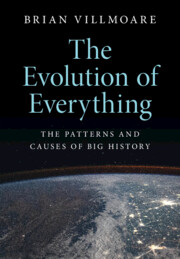Book contents
- The Evolution of Everything
- The Evolution of Everything
- Copyright page
- Contents
- Figure Credits
- Acknowledgments
- Chapter 1: Introduction
- Part I Introduction to the Scientific Perspective on the Past
- Part II Science and History
- Chapter 16: The Neolithic
- Chapter 17: States and Nations
- Chapter 18: Religion and Philosophy
- Chapter 19: The Enlightenment
- Chapter 20: The Industrial Revolution
- Chapter 21: Economics
- Chapter 22: Globalism
- Chapter 23: Modernity
- Chapter 24: Prospects for the Future
- Additional Readings
- Index
Chapter 24: - Prospects for the Future
from Part II - Science and History
Published online by Cambridge University Press: 03 November 2022
- The Evolution of Everything
- The Evolution of Everything
- Copyright page
- Contents
- Figure Credits
- Acknowledgments
- Chapter 1: Introduction
- Part I Introduction to the Scientific Perspective on the Past
- Part II Science and History
- Chapter 16: The Neolithic
- Chapter 17: States and Nations
- Chapter 18: Religion and Philosophy
- Chapter 19: The Enlightenment
- Chapter 20: The Industrial Revolution
- Chapter 21: Economics
- Chapter 22: Globalism
- Chapter 23: Modernity
- Chapter 24: Prospects for the Future
- Additional Readings
- Index
Summary
The final chapter discusses the long-term prospects for the Earth, including demographic changes that are likely to have important long-term implications for humanity, such as the overall decrease in the birth rate, the trends towards increasing literacy, and the importance of educating and empowering women as a factor in the economic progression of societies (perhaps the strongest predictor of economic success in a society). It reviews some of the confounding influences retarding world progression (e.g. our inherent bias towards short-term decision-making, especially in the context of debates over responses to climate change), and how some societies have helped address them successfully. In general, much of human history is the struggle between our impulses and our intellect, and there are innumerable instances of historical ‘failure’, but trends generally point towards improved economics and human rights over the long-term arc of human history.
- Type
- Chapter
- Information
- The Evolution of EverythingThe Patterns and Causes of Big History, pp. 391 - 403Publisher: Cambridge University PressPrint publication year: 2022

